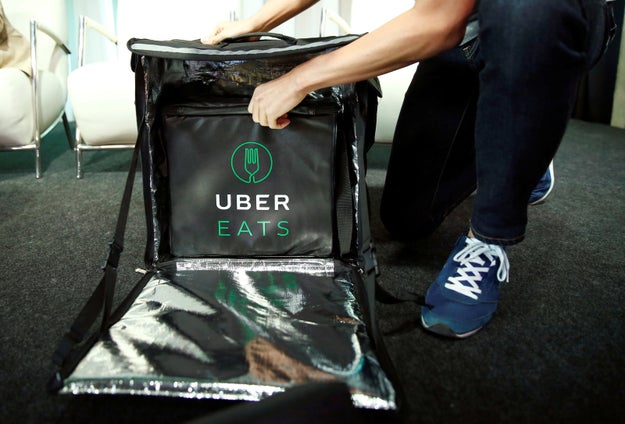[ad_1]

Kim Kyung-hoon / Reuters
A dispute in New York could have far-reaching implications for how Uber treats its on-demand workforce — namely, whether is legally responsible for people injured on the job.
If the case being heard by the New York state Workers’ Compensation board goes against Uber, and classifies the worker as an Uber employee, the company could be on the hook for years' worth of compensation claims. Since its founding, Uber has insisted that the drivers and couriers that work through its app are independent contractors, and it simply runs a software platform that connects them with customers. But efforts are underway nationwide to challenge that assertion, with test cases being filed to state and federal authorities.
The case in New York has been filed by Jorge Washington, a courier for Uber's Rush and Eats delivery services and a founding member of the New York Messengers Alliance, group representing gig-economy delivery people pushing for better pay and conditions. The organization is backed by the New York Taxi Workers Alliance, which successfully organized black car drivers in the city to receive labor protections and benefits like those of yellow cab drivers.
“Ordinarily, this would be a garden variety workers' compensation case,” said Robert Grey, the attorney representing Washington, who has worked with the NYTWA in the past. “But Uber is very motivated to avoid a second hearing because the compensation board will decide on his employment status.”
In an attempt to end the case before it reaches a second hearing, slated for late February, Uber offered to settle with Washington, floating the possibility of a cash payment on the condition that he accept a rejection of his claim and terminate his contract with Uber. Such a settlement would avoid setting precedent, and leave his independent contractor status untested.
Washington and Grey declined, and say they have no plans to accept a settlement of any dollar amount. Grey also believes Uber engaged in unfair retaliation against his client, based on its proposal for termination as part of a settlement deal.
An Uber spokesperson said the company rejects the allegation that it is retaliating against Washington — partly on the grounds that because Washington is an independent contractor, rather than an employee, he is not covered by state labor laws that prohibit retaliation by employers against staff. That Washington is not an employee is, of course, the very point that remains up in the air, and which the state board will decide next month.
The company also insists it merely floated the possibility of a settlement, and made no formal offer.
“This claim — instigated by a taxi medallion-backed organization chasing headlines — is without merit on its face,” the Uber spokesperson told BuzzFeed News in an email. “It fundamentally misunderstands how Uber works and ignores the fact that under the National Labor Relations Act, Mr. Washington can't engage in union activity.”
Should the board rule Uber's messengers are independent contractors, they would not be entitled to the organizing protections and workers' compensation coverage enshrined in labor law. (The reference to 'medallion-backed' is to taxi-cab medallion-owner Ken Salazar, who is married to the NYTWA executive director Bhairavi Desai. The two are half of the four salaried employees of the organization.)

Kim Kyung-hoon / Reuters
“I've seen this movie before,” said Grey, who previously litigated for the labor rights of black car drivers. “Years ago we had these same arguments all the time about for-hire drivers. It's the same movie all over again.”
Uber isn't the only on-demand company dealing with potential workers' compensation charges on the horizon, hinging on the employee classification of the people working through their apps.
Last month, an audit by the Washington Department of Labor and Industries determined that on-demand delivery company Postmates owed more than two years of workers’ compensation payments for more than 3,000 couriers from 2013 to 2015, after it came to light that the company had routinely avoided compensating couriers for on-the-job injuries. Complicating matters, state labor agencies and Workers Compensation Boards have their own tests and standards for determining employee classification, despite the federal Department of Labor issuing a guidance last year in an effort to bring clarity to the question.
Postmates' general counsel Rob Rieders said the assessment was “a misinterpretation of applicable law,” and the company is appealing the ruling with the argument that couriers are independent contractors. Should it stand, the decision would cost the company about $320,000 (plus a $75,000 fee for improper record-keeping) — and fundamentally change the way they do business.
Back in July, Washington said that when he fractured his finger while making a delivery, he immediately filed the information to Uber via the app, but never received a reply. The break happened while he and a customer simultaneously tried to open a stuck door, so he could hand off a package and finish a delivery.
Since Washington lacks health insurance, a friend gave him a splint, bandaged him up, and showed him how to dress the injury. It was Washington's involvement with the Messengers Alliance and the NYTWA that connected him with legal representation and an understanding of the potential consequences of his case for other messengers.
“I would have been another incident swept under the rug,” he said.
The hearing that will rule on Washington's employee classification status is scheduled for February 23rd.
[ad_2]
